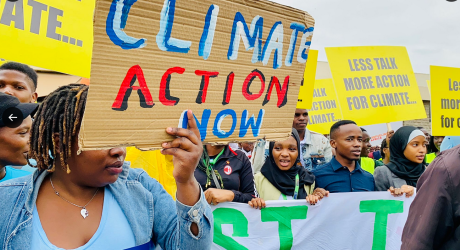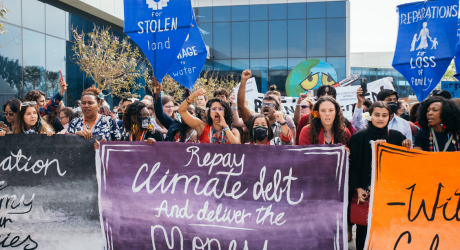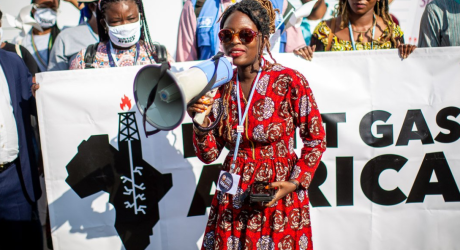AFRICA
In Africa, Oil Change is supporting movement partners in challenging key proposed fossil fuel projects.
OVERVIEW OF WORK
In Africa, Oil Change is supporting movement partners in challenging key proposed fossil fuel projects and calling on African governments and institutions to stop fossil fuel expansion and support energy access and a just transition (see Addis Ababa communiqué).
Together with local partners, we’re working to shift energy financing away from fossil fuels and increase financing for distributed renewable energy to support the goal of providing universal access to all; increase public financing for distributed renewable energy that also ensures a higher degree of local ownership of solutions; expose the scale and source of financing for fossil fuel projects on the continent; support frontline groups in their efforts to resist harmful fossil fuel projects; and support and facilitate convenings for movement partners to support information, capacity sharing, and strategy development.
LATEST PROGRAM POSTS
Last week, some 30,000 delegates and 25 African heads of state, as well as the European Commission President, UN Secretary-General and US Special Envoy on Climate, gathered in Nairobi for the inaugural Africa Climate Summit.
Despite important progress on establishing a loss and damage fund, COP27 failed to acknowledge the need for a rapid and equitable phase-out of oil, gas, and coal.
COP27: Civil Society says “Don’t Gas Africa” and calls for an end of colonial fossil fuel extraction
At a series of events today at the COP27 climate talks, speaker after speaker warned against the Dash for Gas in Africa. One speaker, Mohamed Adow, from PowerShiftAfrica, said: “Africa sits at a crossroads & there is a fight to decide its energy & development future playing out at #COP27. A cabal of fossil fuel companies supported by foreign nations are trying to push Africa into a fossil fuel led development future. We say to them Don’t Gas Africa.”
"Make no mistake — the fossil gas agenda is a neocolonial agenda and patriarchal one. Fossil gas will not provide ‘energy security’ in Africa or anywhere else." –Lorraine Chiponda
LATEST PROGRAM RESEARCH
Communities in Africa have generally contributed the least to climate change, been undermined the most by international trade and finance policies, and have a right to better international support for distributed renewable energy. In order to reach universal energy access before the 2030 target set by the UN Sustainable Development Goals, international public finance institutions have an urgent responsibility to provide more funding and better financial transparency and tracking for distributed renewable energy. Additionally, they have a responsibility to foster local participation in and ownership of distributed renewable energy initiatives. This briefing provides recommendations for how international public finance institutions
A new analysis of the energy finance provided by the African Development Bank (AfDB) shows that while financing for clean energy access has increased since the bank's landmark New Deal on Energy for Africa, support for off-grid and mini-grid solutions — often the fastest and most affordable energy access solutions — must accelerate if Africa is to realize universal energy access by 2030.
Overall, the MDBs are not financing energy access at nearly a sufficient level to meet the needs of energy-poor communities. Much of the energy access finance that is being provided is being directed to many of the communities that need it most. But even so, energy access is not reflected as a priority for the MDBs.




